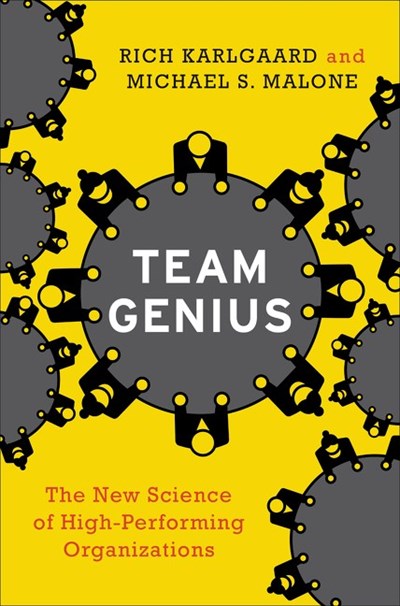Uncategorized Posts
-

Blog / Interviews
A Q&A with Rich Karlgaard & Michael S. Malone
By Porchlight
We continue our Thinker in Residence with Rich Karlgaard and Mike Malone with some questions about their great new book, Team Genius.
Categories: interviews
-

Blog / Interviews
Rich Karlgaard & Michael S. Malone
By Porchlight
In Team Genius, Rich Karlgaard and Michael S. Malone have teamed up to tell why "More than ever, business success now comes down to teams."
Categories: interviews
-

Blog / Staff Picks
Muse: A Novel: A Review
Book Review by Porchlight
Jonathan Galassi, the President of Farrar, Straus, and Giroux, gives us a beautiful tale of publishing and poetry, and the important difference between the two.
Categories: staff-picks
-

Blog / Book Giveaways
The Achievement Habit: Stop Wishing, Start Doing, and Take Command of Your Life
By Porchlight
Bernard Roth, the academic director and one of the founders of Stanford's famed d. school, teaches us how to make achievement a habit.
Categories: giveaways
-

Blog / Blog
Behind the Bestseller List June 2015
By Porchlight
A closer look at three of the books on June's Bestseller List.
-

Blog / Jack Covert Selects
The Achievement Habit: Stop Wishing, Start Doing, and Take Command of Your Life
By Porchlight
In his new book, Bernard Roth, a professor of engineering and academic director at Stanford's famous d. school, teaches us how to engineer a better life.
Categories: jack-covert-selects
-

Blog / Staff Picks
The Wolf in Sheep's Clothing: Hilary Mantel's Wolf Hall and Bring Up the Bodies
Book Review by Sally Haldorson
Not unexpectedly, there are plenty of leadership lessons, or perhaps warnings, one can draw out of these two Booker Prize winning novels about Thomas Cromwell's 'reign' as King Henry the VIII's primary advisor.
Categories: staff-picks
-

Blog / ChangeThis
Transforming Business—Successfully
By Porchlight
"Enterprises everywhere are experiencing the 'business outcome gap. ' The business outcome gap can be defined as the difference between desired business outcomes and realized business outcomes. Desired outcomes are changing in response to rapidly evolving stakeholder needs, whether the stakeholders are employees, customers, or shareholders. Globalization, disruptive technologies, smart devices, and social media have all had a profound effect on how we approach work and get important programs done. While realized outcomes may be improving, for most enterprises the increase in desired outcomes is far outstripping the realized. Not only do enterprises see a business outcome gap, but also the lack of innovation to stay relevant to the dynamic needs of the customer and market. In order to close the business outcome gap, constantly innovate, and get more customer centric, enterprises are increasingly embarking on business transformation programs or large-scale strategic projects. However, according to a recent study, organizations lose an average of a staggering $109 million for every $1 billion spent on projects.
Categories: changethis
-

Blog / ChangeThis
The Genius of Teams
By Rich Karlgaard, Michael S. Malone
"More than ever, business success now comes down to teams. Of course, teams have always been vitally important. One hundred thousand years ago, hunting teams were vital to the survival of early man. With the rise of agricultural civilization, teams were the basic operating unit of social hierarchies and communities. But for the last few millennia, while remaining a crucial building block, teams have been largely made subordinate to larger social organizations: armies, governments, bureaucracies, corporations, etc. But the rise of the digital age, the Internet, and the global economy has changed all of that. As with many other cultural institutions, technology is beginning to turn organizations upside down. "
Categories: changethis
-

Blog / ChangeThis
Local Networks, Global Change: Working Locally through the UN Global Compact
By Porchlight
"The United Nations Global Compact (UNGC) is the world's largest corporate responsibility movement with some 8,000 businesses employing over 50 million people in around 150 countries. [...] Encouraging as it is, 8,000 companies represents only about ten percent of truly international companies in the world and only a tiny fraction of the small and medium enterprises which provide most employment. If we are to achieve real change we need to engage a much wider range of companies."
Categories: changethis

